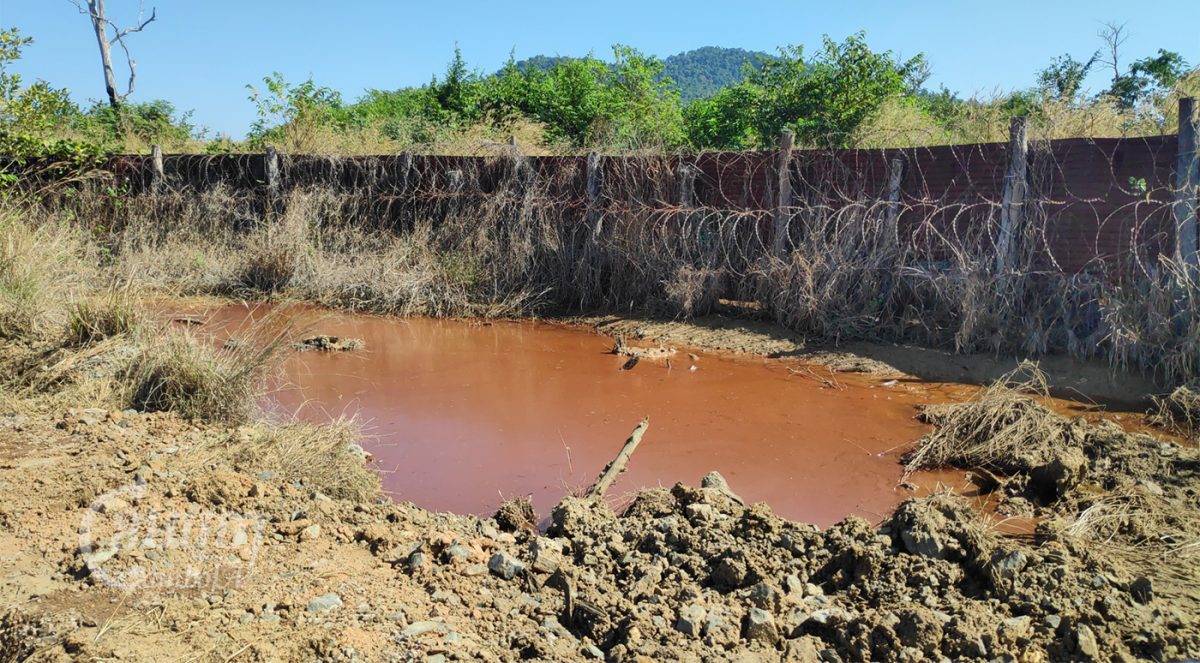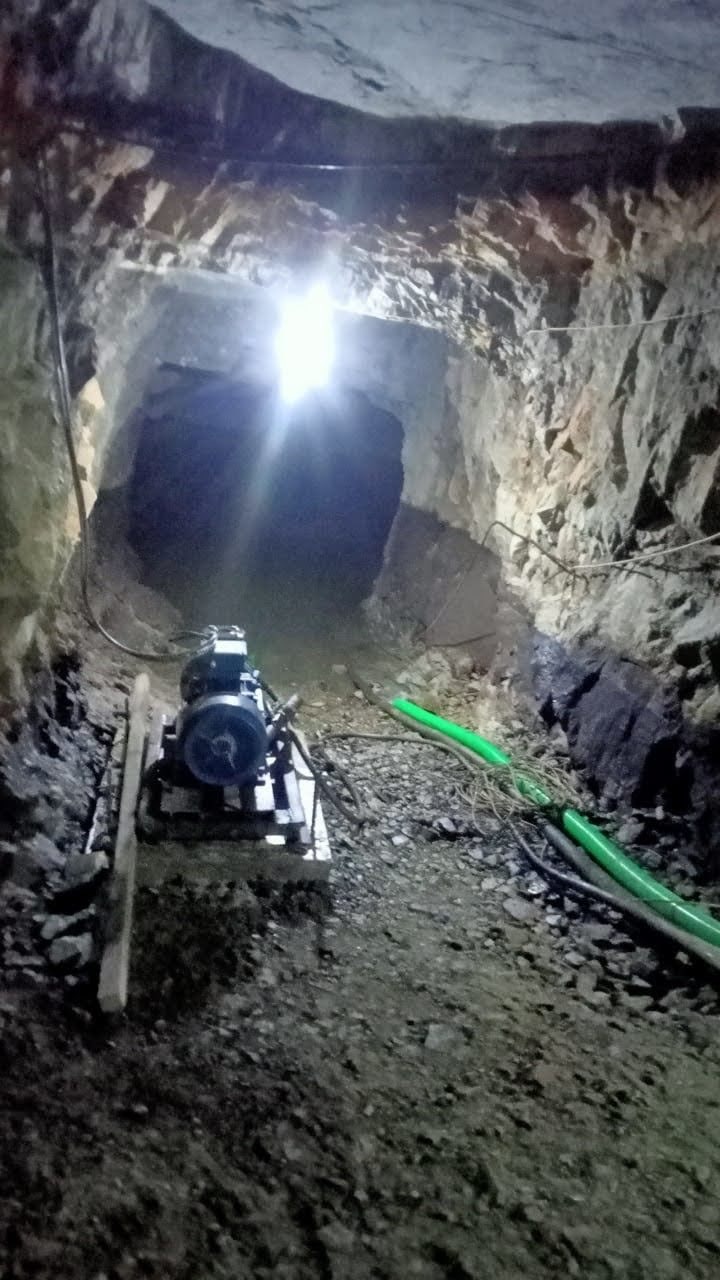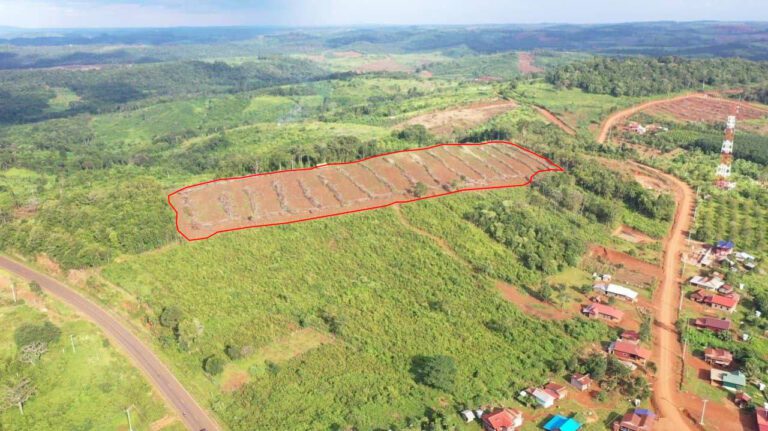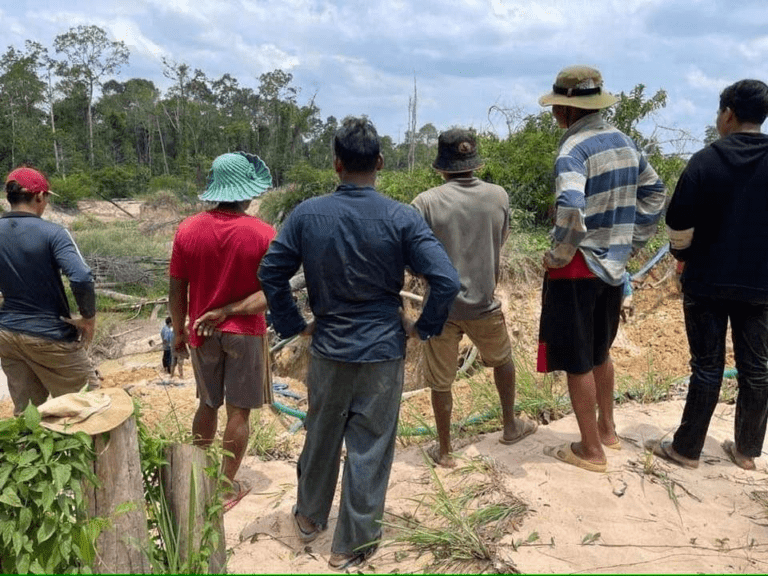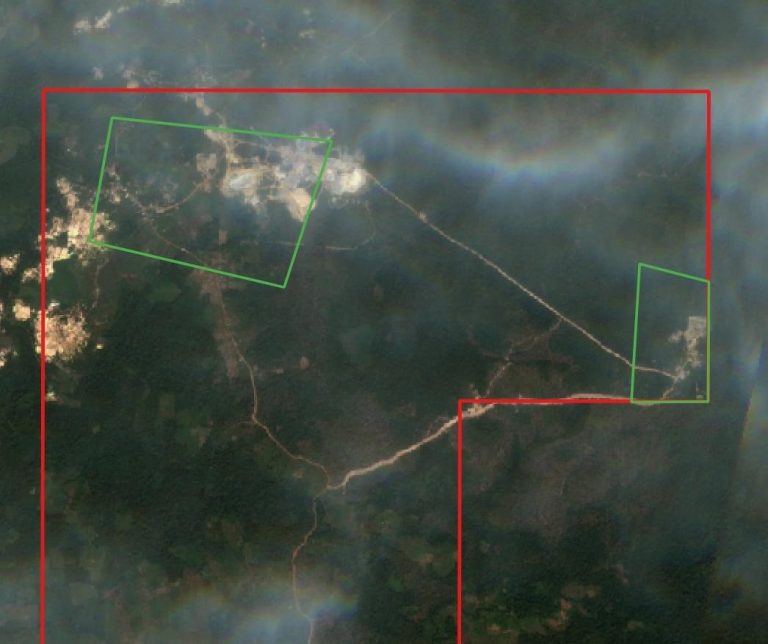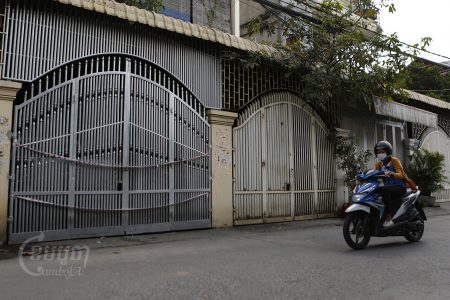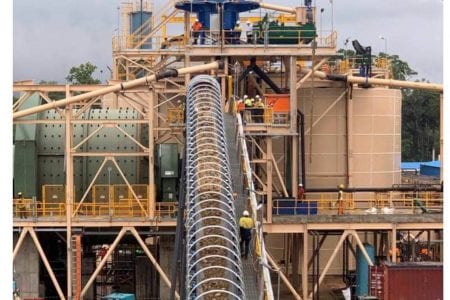Preah Vihear Province: Twenty years ago, the streams that run through the remote village of Totim in Preah Vihear’s Rovieng district, sparkled with gold. Those flecks drew poor farmers to the Romdeng community, looking to sift for gold and improve their livelihood. Before long, it also brought a large-scale mining operation — along with mounting problems.
In the decade since Delcom, a joint Cambodian-Chinese gold mining company, began its operations, the community has lost almost all of its forests and residents struggle with livestock health issues and chronic land disputes. The situation is a marked change from what villagers experienced when first moving to the community.
Sitting under the porch of a zinc-roof house, Tuy Chheng, a 65-year-old former elementary school teacher and community representative, said he longed to return to the past; before the company came.
“My hometown is in Kampong Cham. Since I have many children, my livelihood was too poor and my salary was low, so I brought my wife and children to live here.” When he moved to the area in the early 2000s, he said, there were only about 20 to 30 families.
“When we first came to live here, there were very few villagers. We were engaged in farming, sifting gold, and getting non-timber forest products. All of these occupations lead to a better life than our homeland.”
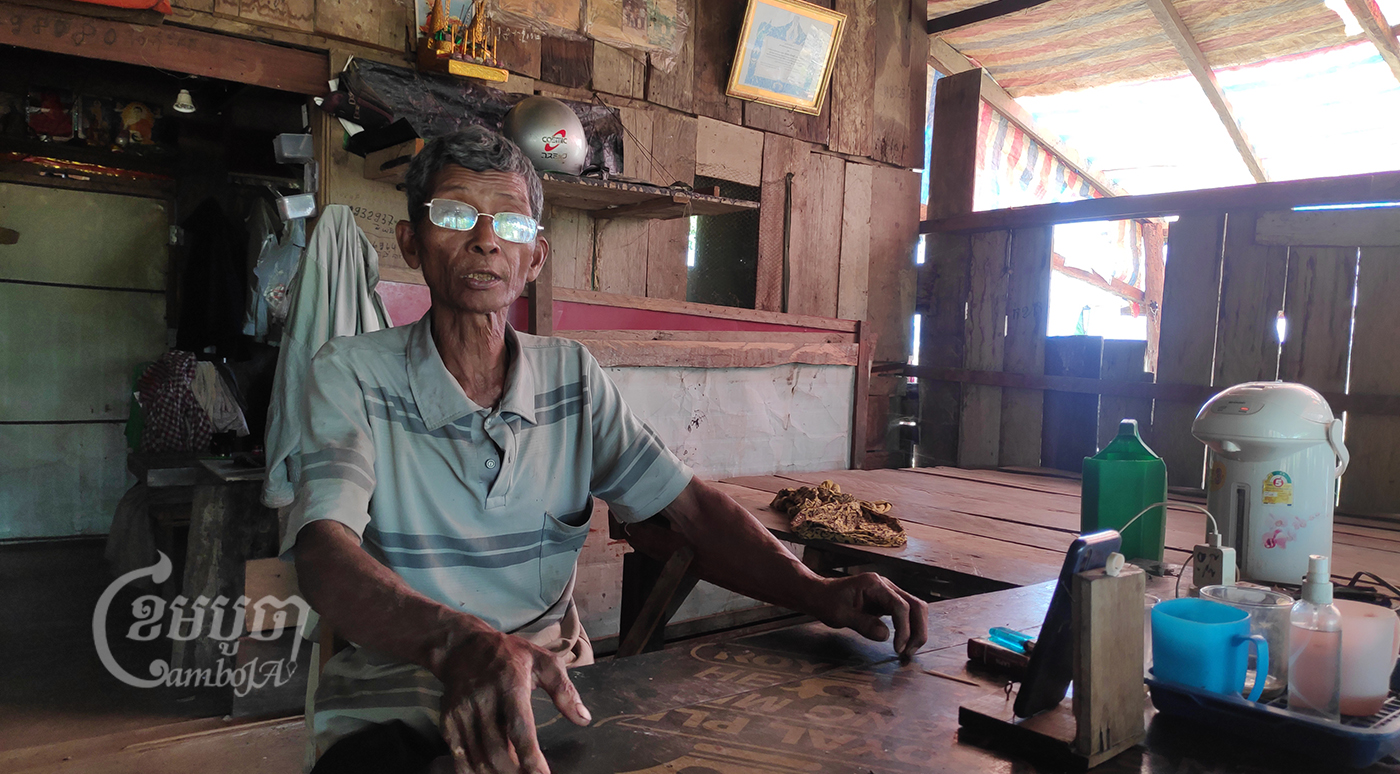
Mao Mach, a 58-year-old widow, said she and her family moved to Romdeng in 2005 from about 20 kilometers away.
“My husband came to sift gold here so we came together. At that time, I had three children and when I arrived in Romdeng, I got two more children… The first few years here were very rich — there were fish in the rivers and wildlife, and I could earn a decent income.”
Sam Muth, Romtom commune chief, said that the population in the Romdeng area has been steadily increasing due to the gold.
“People who come to live there hope to do gold-sifting works and look for timber. Since 2000, the population has increased to more than 200 families, not counting the migrants who come to rent the land for plantations or gold sifting.”
But the same gold drew bigger investors. The government’s 2009-2013 National Development Plan led to the provision of land concessions for private companies to engage in agro-industrial and mining businesses. DELCOM Campuchea PLC.Ltd was licensed in 2009 to explore for gold. Documents from the Open Development Cambodia show that it received exploration permission to mine at Phnom Dek in Romtom commune, with an initial investment of 500 million riels (about $ 1.2 million) on a 100-hectare site.
Forest loss
The Environmental Impact Assessment report of the first phase of the gold mining project showed that the entire area was forest cover. Of that, some 10 percent was dense forest with big trees and the rest was mixed forest with medium height trees.
Today, there is no longer any dense forest, while mixed forest is present only in small patches.
“When I moved to live in this place, the forest was everywhere. There was only a small road for the carts. Everywhere was full of the forest, not like now,” said Chheng, the community representative.
After receiving the economic land concession, the company started clearing forest land for its mining operations, said Chheng. But at the same time, the community was also clearing land for plantations — in part because many believed if they didn’t the company eventually would.
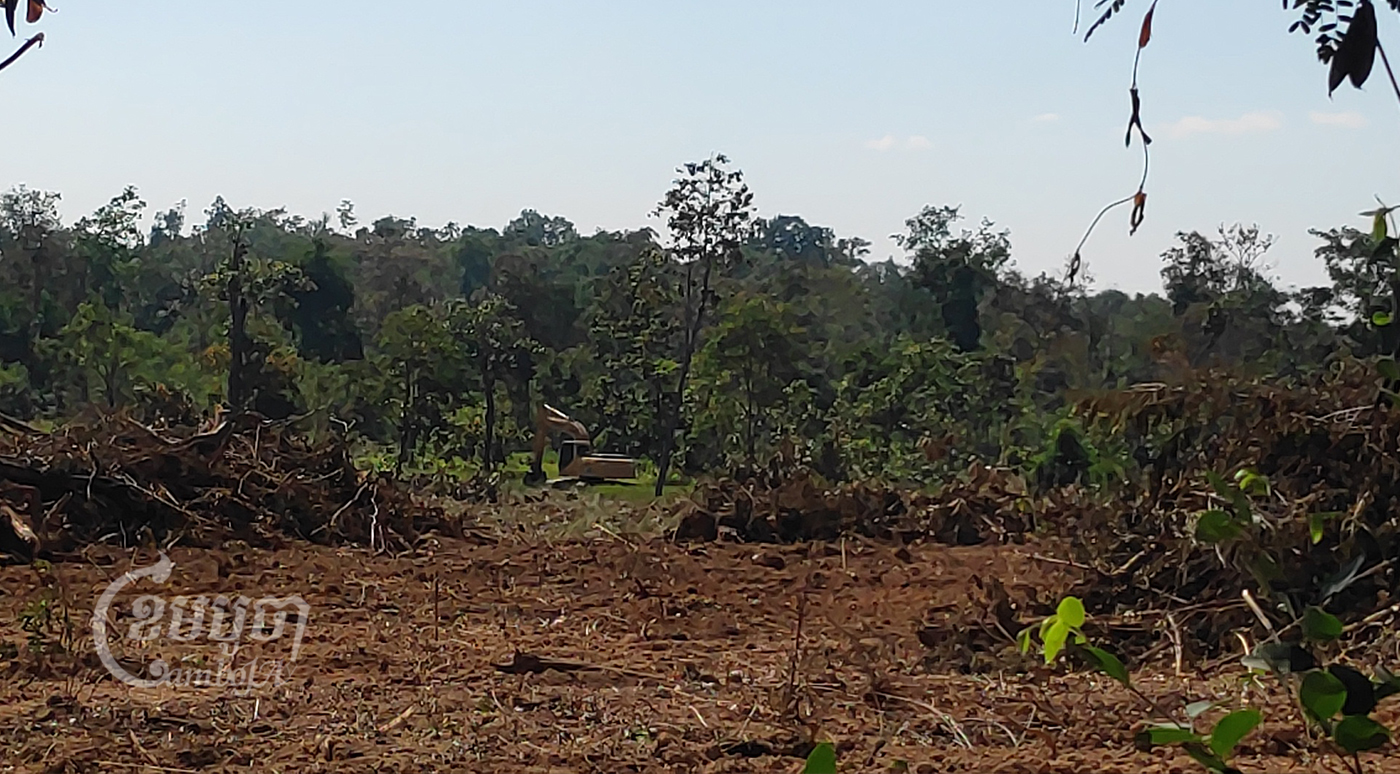
Muth, the Romtom commune chief, said so much has been cleared that villagers can no longer support themselves from the forest.
“Most of our people are now rice farmers and some of them sift gold. If we rely on wood or non-timber forest products like we did more than 10 years ago, it’s not possible [to earn anything] because we have no more forest.”
Last month, Delcom launched an operation to clear the remaining forest land, with two machines active from morning to evening.
A driver who asked not to be named told a reporter: “My boss told me to clear all the forest [company land]. I do not know when it will be over. We have just worked for three days.”
On either side of the road to Romdeng, there are thin bushes and hundreds of hectares of cassava plantations. Some of the land has posters for sale, some are surrounded by fences. Just a few decades earlier, all of this was forest.
Poek Sophoan, executive director of Ponlok Khmer, said the Romdeng area had lost its forests due to the presence of gold mining companies, economic land concessions, and the land clearing for plantations by individuals.
“The forest is almost gone. One part fell to the hands of the company and on the other part, the villagers cleared for farming and making a living. The loss of the forest is not only affecting the livelihoods but also the traditional land of the people living there too,” he said.
Polluted water
The forest is not the only thing to vanish in Romdeng. Clean water has been contaminated, impacting the community at large. Chemicals used to filter gold seep into the soil and water sources. Residents say livestock have fallen ill and died for no apparent reason.
A few years ago, said Chheng, a large number of cattle began dying. After residents pinpointed a stream that flowed past the gold refinery spot, “people in our village were very careful not to tie cows near or let cows wander because we are afraid that the cows will die again.”
In addition to Delcom, there are dozens of small gold-mines competing for water to filter gold. The sound of pumps echoes through the village from dawn to dusk. Along the road, the small ponds are murky, while the pond closest to Delcom’s fence is a stark orange color.
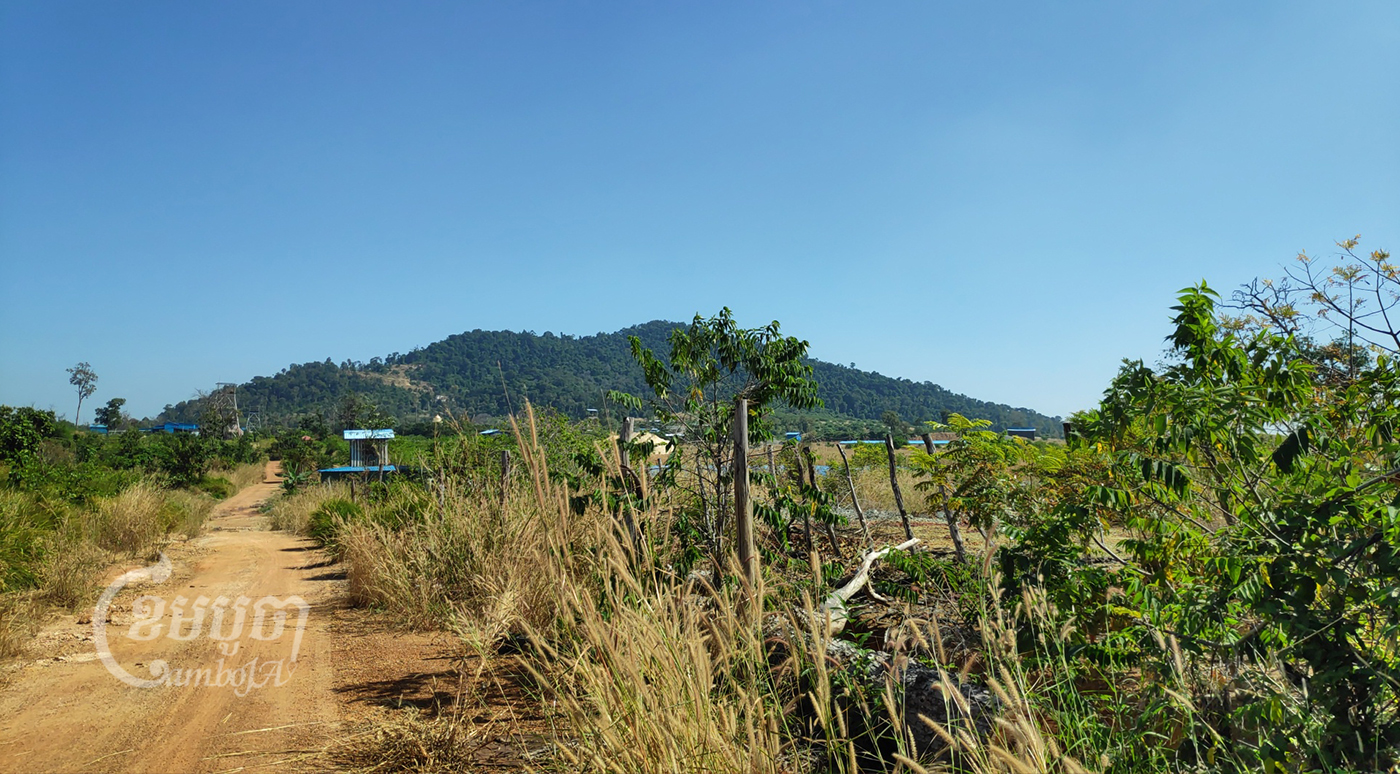
Seng Sao, 35, said he had been sifting gold in Romdeng for more than a year. Five members of his family had rented land to do this work, but he did not use chemicals to refine the gold. That makes him the exception.
“I rent the other`s land for $300 a month to sift gold. I pump water and spray it on the baskets. I don’t use any chemicals, but I also know that some people use chemicals.”
Chheng, who works with civil society to collect water samples from the area, said the toxin level is a matter of concern.
“I gave water to the organization to test it. It has toxic levels. Orange toxicity levels mean a high level of caution and red levels are highly toxic. Most of the water here is at a high level of caution, meaning it is toxic but can be used for cooking if properly filtered, but if it is not filtered, it can’t be used.”
He said that the water sourced near Delcom’s operations has such a high level of toxicity it can’t be used under any circumstance.
“The water in the pond next to the fence of the company and in the small river south of the company is at a very dangerous level, red, and even with filtering still cannot be used. Expert officials banned people from using and even cattle are not allowed to get close.”
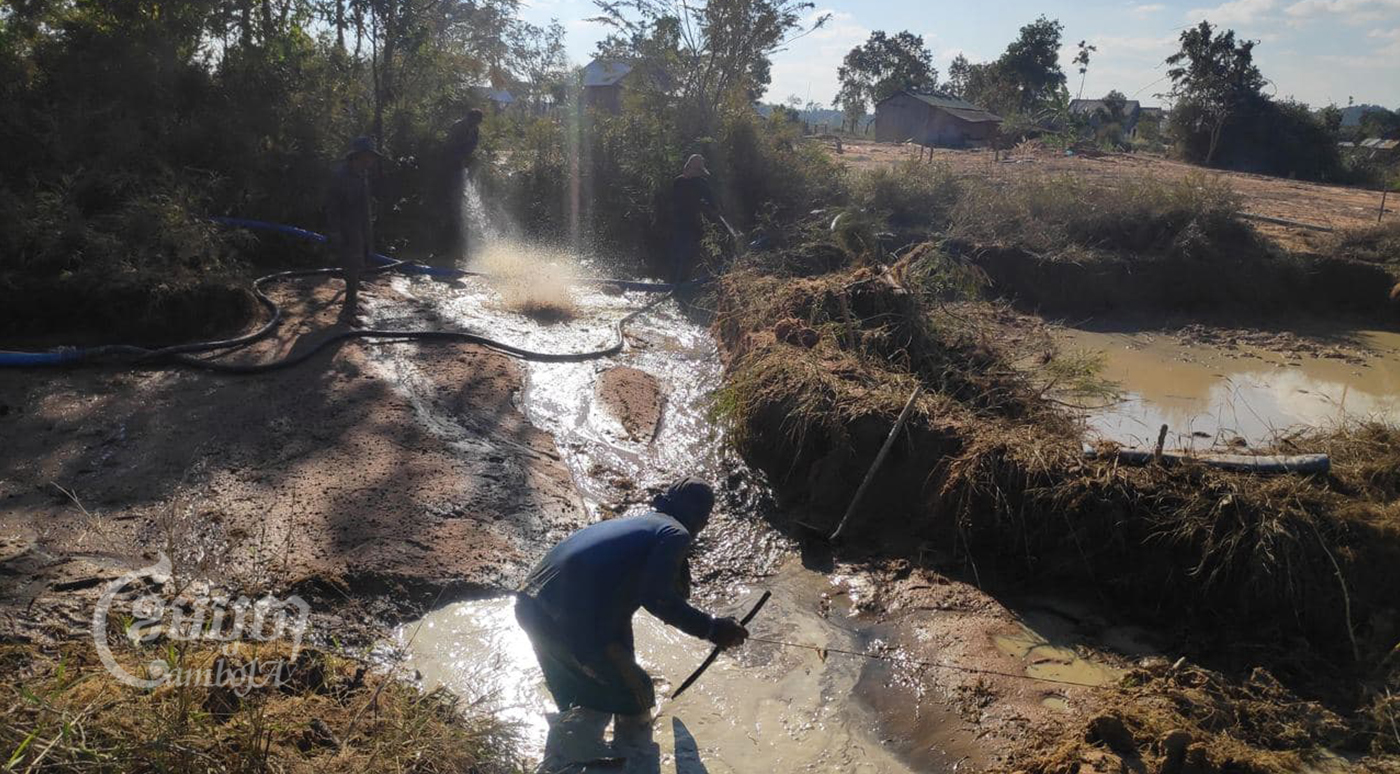
Most of the people in Romdeng do not dare to take water from streams, ponds, or wells to drink or cook. Instead, they spend significant sums of money to buy water for drinking and cooking. Each day, two or three water trucks arrive to sell water to the villagers.
Mao Mach said that her family buys 40 liters of water every day.
“My family uses a lot of water, two containers which sell for 3,000 riels per container; a total of 6,000 riels per day. If we could use well and pond water in the village, we would save that money,” she said.
Preah Vihear Provincial Department of Mines and Energy Director You Chendayuth could not be reached for comment.
Preah Vihear Provincial Hall Director of Administration Yong Kim Hoeun said that the authorities have been closely monitoring the issue, but said concerns about toxicity levels were overblown.
“The issue of toxic water is just a concern or worries of the people. People are always scared,” he said.
“The provincial specialized department is stationed there directly. The toxins cannot come out of the factory. The company has proper management.”
A long-standing dispute
The land dispute between nearly 30 families in Romdeng and the Delcom company has been going on for many years.
In 2015, after pushing people from their land and paying out compensation that many villagers considered inadequate, some returned. Delcom sued the Romdeng community, accusing them of encroaching on company land.
Chheng said he and four other villagers were summoned by the court to be questioned.
“The company said I was leading the people to encroach on the company land. But I still persist because all these lands are the blood and sweat of the villagers.”
The land disputes were so severe that the ruling Cambodian People’s Party received nearly no votes in the 2017 election. Muth, the community representative, ran as a member of the opposition CNRP and was elected as commune chief. When the opposition was dissolved, shortly thereafter, Muth defected to the CPP, still holding the post of commune chief.
Years later, said Muth, the land dispute is still ongoing.
“I do not know clearly how far it has been solved. I just heard the people say it is not completely finished yet.”
Rovieng district governor Hor Bunhour said he could not comment on land disputes in the Romdeng area by telephone.
“I want to tell you that this case is protracted. I cannot talk on the phone. Please forgive me,” he said.
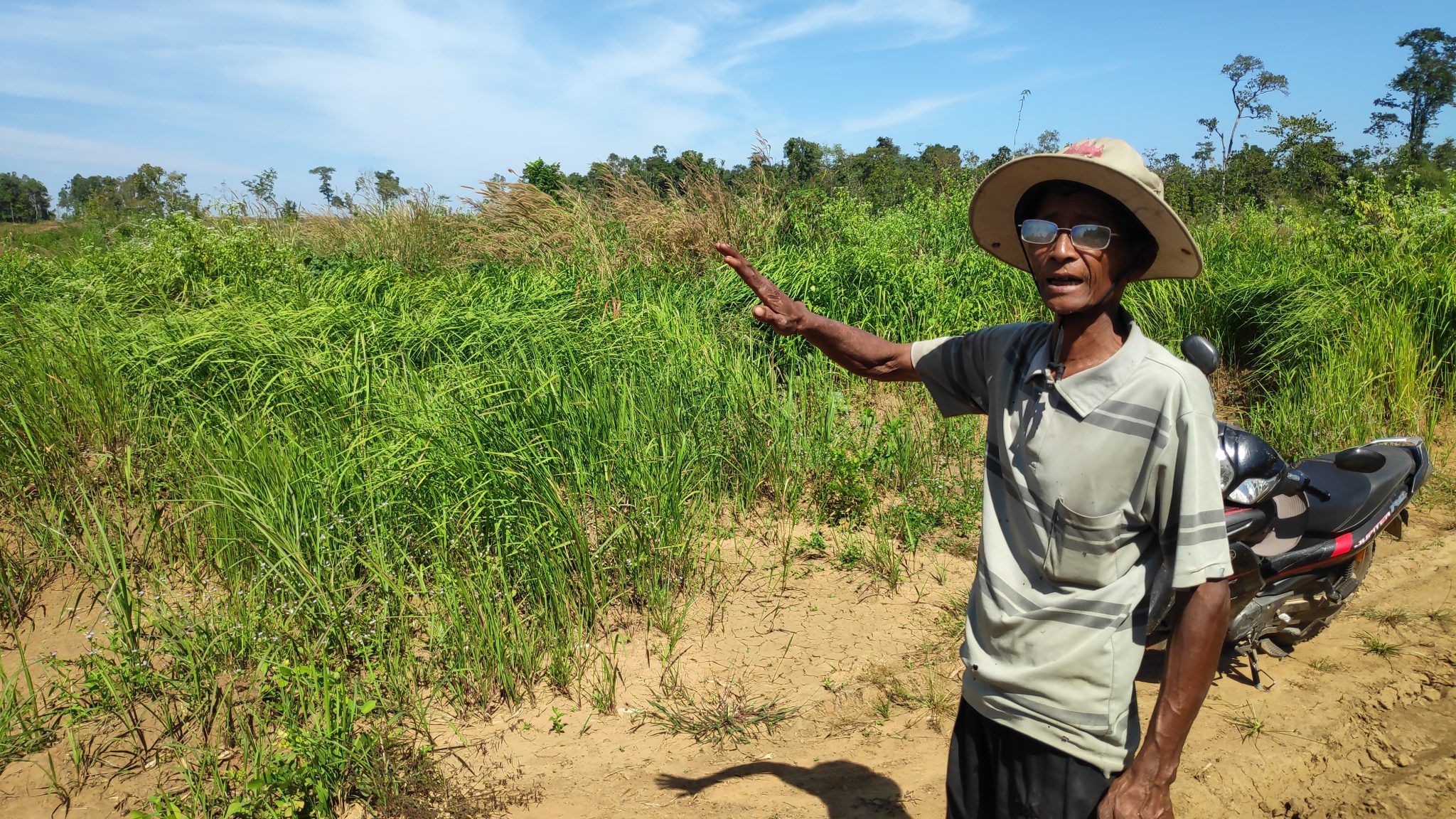
Sophoan, the executive director of Ponlok Khmer, said residents were seeking to have their land returned.
“It is not yet done because people are still not satisfied. They think it is unjust. They come to ask for the intervention of civil society on legal aid. I have received information that people have filed complaints to the Ministry of Interior, and to the provincial hall since the middle of last year, but have not seen any action yet.”
Sophoan said he was concerned that land disputes in Romtom commune could escalate after an increase of private companies investing there.
“Currently, it is not just Delcom alone, there are two other companies. The first is San Sin and the second is Kim Chea Thuon companies. We understand that the authorities should study and solve the problems transparently in order to gain support from all walks of life.”
Sinsan is a gold mining research company, while Kim Chea Thuon is an investment company in the cassava agro-industry. Locals suspect that the two companies are the only subsidiaries of the Delcom company because the three companies have a single supervisor.
“I cannot say. I’m sorry,” said the company supervisor who declined to give details or name.
Preah Vihear provincial administration director Yong Kim Hoeun insisted that local officials were working to resolve the situation.
“The three companies are different, not one. Authorities at all levels in our provinces are almost done in settling land disputes, and there are very few that we will try to resolve in the near future.”
Documents obtained by CamboJA show that the gold mining site of the Delcom company employs mostly foreign workers, including five Chinese engineers, more than 30 Chinese workers, three cooks and 15 Cambodian security guards.
Chheng said the gold mining company’s investment has not benefited the local community at all.
“I do not know how much the company pays taxes to the state,” he said. “But obviously, this gold factory did not help the villagers. Our water is polluted, our land is lost and the forest is gone. The road to the village was broken and we are being sued in court.”
Translated from Khmer’s article: ការវិនិយោគក្រុមហ៊ុនរ៉ែមាសបរទេសនៅខេត្តព្រះវិហារនាំកង្វល់ដល់ប្រជាសហគមន៍


